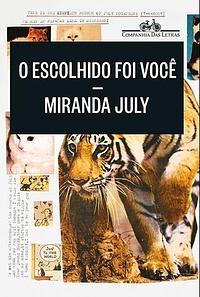Take a photo of a barcode or cover
funny
lighthearted
medium-paced
A nice quick read with lovely photographs. Really this book is two things: musings on how much July's (and most of ours) life has changed since the advent of pervasive digital culture, and secondly a behind-the-scenes look at how she finished her latest film (The Future). Die-hard fans of July will most likely love this, but it may not be fore everyone.
Interesting concept, poor execution. The more I think about it the less I like it.
I usually like Miranda July and her work, but this book is the embodiment of a lot of the criticism she receives. She exhibits very little self-awareness and empathy in regards to the people she interviews. And rather than using these interviews as opportunities to delve into the inner lives of these strangers, they become spring boards off of which she casts judgment and repeatedly complains about how hard it is to write and finance her movie. There are many moments where the book feels like an exercise in poverty tourism.
This book would have been much more successful and insightful if July had spent more time on the people she was "so brave" to seek out via the PennySaver and less time whining and explaining why her movie, "The Future," was probably going to suck (spoiler alert: it did).
I usually like Miranda July and her work, but this book is the embodiment of a lot of the criticism she receives. She exhibits very little self-awareness and empathy in regards to the people she interviews. And rather than using these interviews as opportunities to delve into the inner lives of these strangers, they become spring boards off of which she casts judgment and repeatedly complains about how hard it is to write and finance her movie. There are many moments where the book feels like an exercise in poverty tourism.
This book would have been much more successful and insightful if July had spent more time on the people she was "so brave" to seek out via the PennySaver and less time whining and explaining why her movie, "The Future," was probably going to suck (spoiler alert: it did).
hopeful
reflective
fast-paced
Intriguing premise. Novel interviews. Constantly enjoyed it.
"I doggedly asked each PennySaver seller if they used a computer. They mostly didn't, and though they had a lot to say about other things, they didn't have much to say about this, this absence. I began to feel that I was asking the question just to remind myself that I was in a place where computers didn't really matter, just to prompt my appreciation for this. As if I feared that the scope of what I could feel and imagine was being quietly limited by the world within a world, the internet. The things outside of the web were becoming further from me, and everything inside it seemed piercingly relevant. The blogs of strangers had to be read daily, and people nearby who had no web presence were becoming almost cartoonlike, as if they were missing a dimension.
"I don't mean that I really thought this, out loud; it was just happening, like time, like geography. The web seemed so inherently endless that it didn't occur to me what wasn't there. My appetite for pictures and videos and news and music was so gigantic now that if something was shrinking, something immeasurable, how would I notice? It's not that my life before the internet was so wildly diverse — but there was only one world and it really did have every single thing in it. Domingo's blog was one of the best I've ever read, but I had to drive to him to get it, he had to tell it to me with his whole self, and there was no easy way to search for him. He could be found only accidentally.
"Scientifically, my interviews were pretty feeble, as questionable as 'The Missing Movie Report,' but one day soon there would be no more computerless people in Los Angeles and this exercise wouldn't be possible. Most of life is offline, and I think it always will be; eating and aching and sleeping and loving happen in the body. But it's not impossible to imagine losing my appetite for those things; they aren't always easy, and they take so much time. In twenty years I'd be interviewing air and water and heat just to remember they mattered."
"I doggedly asked each PennySaver seller if they used a computer. They mostly didn't, and though they had a lot to say about other things, they didn't have much to say about this, this absence. I began to feel that I was asking the question just to remind myself that I was in a place where computers didn't really matter, just to prompt my appreciation for this. As if I feared that the scope of what I could feel and imagine was being quietly limited by the world within a world, the internet. The things outside of the web were becoming further from me, and everything inside it seemed piercingly relevant. The blogs of strangers had to be read daily, and people nearby who had no web presence were becoming almost cartoonlike, as if they were missing a dimension.
"I don't mean that I really thought this, out loud; it was just happening, like time, like geography. The web seemed so inherently endless that it didn't occur to me what wasn't there. My appetite for pictures and videos and news and music was so gigantic now that if something was shrinking, something immeasurable, how would I notice? It's not that my life before the internet was so wildly diverse — but there was only one world and it really did have every single thing in it. Domingo's blog was one of the best I've ever read, but I had to drive to him to get it, he had to tell it to me with his whole self, and there was no easy way to search for him. He could be found only accidentally.
"Scientifically, my interviews were pretty feeble, as questionable as 'The Missing Movie Report,' but one day soon there would be no more computerless people in Los Angeles and this exercise wouldn't be possible. Most of life is offline, and I think it always will be; eating and aching and sleeping and loving happen in the body. But it's not impossible to imagine losing my appetite for those things; they aren't always easy, and they take so much time. In twenty years I'd be interviewing air and water and heat just to remember they mattered."
With the release of her latest novel, All Fours, I have been re-visiting Miranda July's work. I remember reading It Chooses You freshly out of high school, which was a time when I loved everything Miranda July. Her quirky, playful, unorthodox style of work always made me feel connected to myself and to my humanity and made me think, "wow, who else connects with the world in the same ways that Miranda July does?!" Now a decade has passed since I first picked up the book, and while I feel similarly, her privilege is now glaringly obvious, and even hurtful to me. I mean, was it really necessary to elaborate on the disgust she had for the jello salad that was shared with her?
That being said, there is still quite a lot of value in It Chooses You. We meet a handful of earnest, ordinary people with unique stories and dreams that we may not otherwise have known if it weren't for Miranda July. The photos that accompany their stories are raw and honest. We get glimmers of life in 2009, when it didn't feel absolutely necessary to have a computer like it does now, and it makes you think about how the art of commerce via ink and paper (such as the PennySaver, in this case) may soon be completely obsolete.
That being said, there is still quite a lot of value in It Chooses You. We meet a handful of earnest, ordinary people with unique stories and dreams that we may not otherwise have known if it weren't for Miranda July. The photos that accompany their stories are raw and honest. We get glimmers of life in 2009, when it didn't feel absolutely necessary to have a computer like it does now, and it makes you think about how the art of commerce via ink and paper (such as the PennySaver, in this case) may soon be completely obsolete.
How touching, beautiful, sad, hopeful, nostalgic, commemorative, romantic, big, hidden, sweet, and human.
I opened this book this morning and couldn't put it down until Miranda showed me what she wanted me to see.
I would highly recommend this for any lover of people and things like "Humans of New York" and "PostSecret"... Then go watch The Future and feel your heart burst and your face leak and leave a new person because now you know there is always something real to fiction; it's not always make believe.
I opened this book this morning and couldn't put it down until Miranda showed me what she wanted me to see.
I would highly recommend this for any lover of people and things like "Humans of New York" and "PostSecret"... Then go watch The Future and feel your heart burst and your face leak and leave a new person because now you know there is always something real to fiction; it's not always make believe.
We all know what it's like when you've got something you should be doing but the ever present lure of the internet sucks you in. When Miranda July was writing her screenplay for The Future, her procrastination knew no bounds. She started reading the PennySaver, a classifieds booklet that comes weekly with the junk mail. Michael was selling a leather jacket for $10. She wondered what sort of person would place that ad so she called him up and asked if she could interview him.
It Chooses You contains the interviews of the people she meets through the PennySaver, accompanied by photographs by Brigitte Sire. In the age of the internet I can understand the intrigue of these people that go for a more personal approach to selling their random stuff. Miranda asks them all if they use a computer and the answer is mostly not really. It's a little peek into the lives of others. And is quite touching in places though I did worry a bit about the sanity of some. It's certainly not the LA most of us imagine.
The photographer side of me loved the photographs. They're the kind of documentary photos that aren't going to blow you away but reveal a lot about the people, from portraits to items in their homes. There's a project called 100 Strangers whereby you approach a stranger and ask to take their photo and have a bit of a chat at the same time. Some use this as a way to improve their photography but others use it to document a little part of other people's lives. Miranda's project reminded me a little of this but with a wonderfully unique slant.
Miranda also talks a little about the film-making of The Future from the script to the inclusion of one of the people she met through the PennySaver ads. If you've seen the film, I'm sure the book would give you a bit of insight into it.
It Chooses You contains the interviews of the people she meets through the PennySaver, accompanied by photographs by Brigitte Sire. In the age of the internet I can understand the intrigue of these people that go for a more personal approach to selling their random stuff. Miranda asks them all if they use a computer and the answer is mostly not really. It's a little peek into the lives of others. And is quite touching in places though I did worry a bit about the sanity of some. It's certainly not the LA most of us imagine.
The photographer side of me loved the photographs. They're the kind of documentary photos that aren't going to blow you away but reveal a lot about the people, from portraits to items in their homes. There's a project called 100 Strangers whereby you approach a stranger and ask to take their photo and have a bit of a chat at the same time. Some use this as a way to improve their photography but others use it to document a little part of other people's lives. Miranda's project reminded me a little of this but with a wonderfully unique slant.
Miranda also talks a little about the film-making of The Future from the script to the inclusion of one of the people she met through the PennySaver ads. If you've seen the film, I'm sure the book would give you a bit of insight into it.







